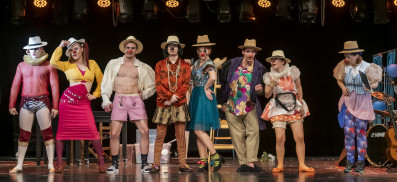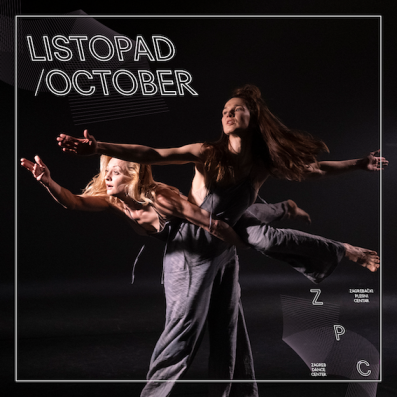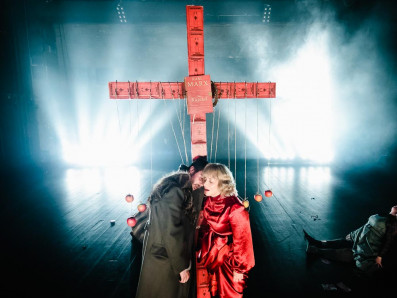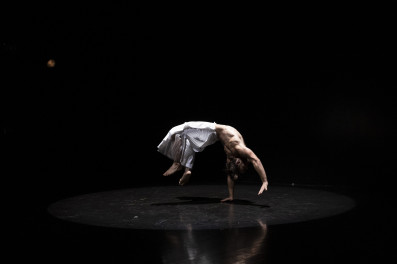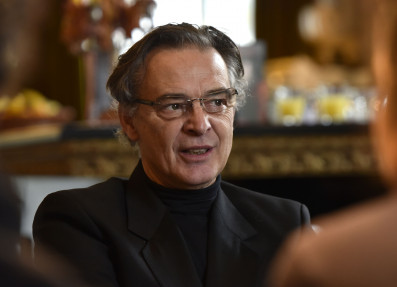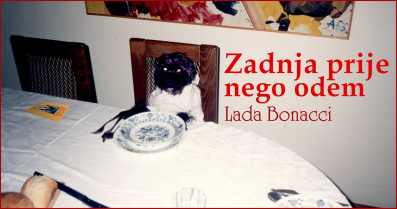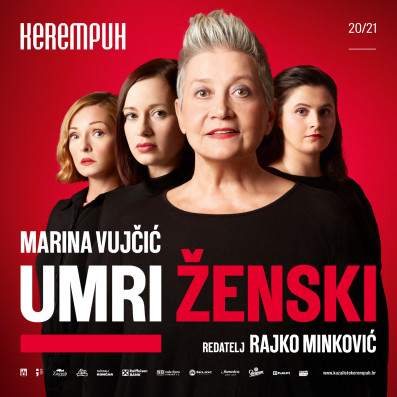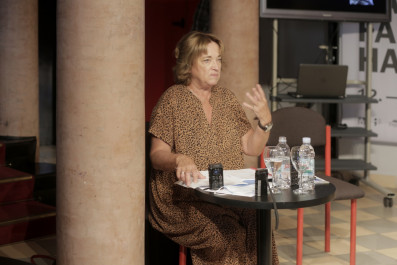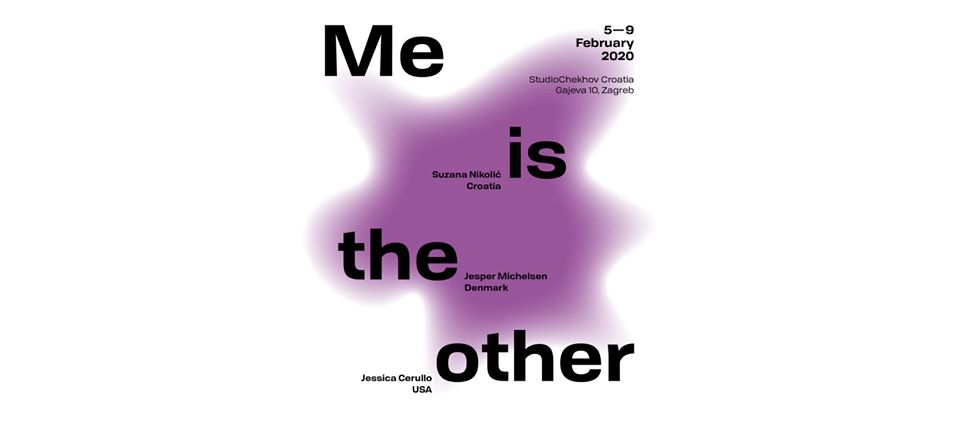
Me Is The Other
On StudioChekhov´s upcoming international workshop, talking to the Artistic Director Suzana Nikolic
Upon moving to Zagreb I began reading The Path of the Actor, an autobiography of Michail Chekhov. Knowing not that a diligent professor, actress and former Head of Acting department actually based a Chekhov practice, I came to StudioChekhov by a pure chance. Perhaps it was me radiating the love I had for new ways of exploring on stage life, questioning my approach to acting and the role of each individual asset; be that how it may, the Studio gave me a first-class experience in what every actor needs. Free space with keen viewers and supportive mentoring.
The totality of presence required by the theatre is executed to perfection by one’s awareness and understanding. Whereas many a time, we might think talent is a keynote, what enters the picture the most is the constant need for a change; not just for the sake of it. Chekhov´s teaching reverberates and flows in and out of the material world with just one command- Move. With ease, with a sense of beauty, within the all-imaginable realm of qualities. To enter this world was partially to enter a world of re-assessment of one’s goals and inner mechanism for transformation. Through movement one becomes a bare presence, one´s entire body a warm ball of light molding the words in the heat of a moment. To know and to be able to pair it as a mechanism, to apply it in order to find the actuality, the belonging of a character in one’s experience must, after his words, be a trial of a lifetime.
Suzana Nikolic, the Artistic Director of the Studio, with over two decades of experience regarding Chekhov technique has lately been working on a new Workshop. Zagreb will be a host to two other colleagues, Jesper Michelsen from Denmark, who has worked with the MICHA (USA based Chekhov Association) also the founder of Glad Teater, and Jessica Cerullo, the former Managing director of MICHA since 1999. Together they are to bring in action the second module called Me is the Other, from 5th to 9th of February in a beautiful room of Gajeva 10. Following the prior visits and works with teachers like Ulrich Meyer Horsch (Hamburg) and David Zinder (Tel Aviv), this will be a new opportunity for aspiring actors, professionals and, indeed, any person interested in creative work of any kind to be re-acquainted with Chekhov`s approach to performativity.
How did your interaction with theatre begin and how did it shape you like a person?
It began very naturally, as I always belonged there. One thing which was very much unnatural to me, and it still is, was hypocrisy and dishonesty everywhere in the theatre. One finds a lot of that in and around the theatre most of the time. That was painful. But you always have a choice to participate or not. I did participate in it when I was younger because I didn’t know what else to do, I was afraid that I would not get a part, I just wanted to play/perform, to be an actress. But I didn’t like the game, so I started to search for more and that led me to Michael Chekhov and if
anything shaped me in the theatre as a person and as an artist, that was Mr. Chekhov legacy and work.
How did Chekhov s work come to you and what made you so deeply connected to his approach?
It was a two-way street. I was going towards it and it was going towards me. When I applied for a Fulbright scholarship, I didn’t have any plan to find Michael Chekhov Technique, about which I knew through his book “On the Technique of Acting” which was given to me by my mentor at the time, prof. Lonza. But when I arrived as a scholar to NYU Tisch School of the Arts Graduate Acting Programme in New York, I met his former student, Joanna Merlin, and was immediately hooked. It was in 1998 and the rest is history, as they say. As soon as I started to practice the Technique I found enormous freedom, independence, creativity within myself that I didn’t know that exist in me. It was very liberating in the most artistic way which felt enormously good and pleasing. Very soon I learned how to access those fascinating resources within myself and I don’t get enough of it still after more than 20 years of working with the Technique. It is still incredibly inspiring.
Is transformation ever painful for actors or spectators?
Nope, it shouldn’t be. If it is, that’s a sign that you are not working with the feeling of ease in the first place or you are doing something wrong. Nothing that is truthful should be heavy or painful. One experiences different sensations and emotions and feelings, but not physical or psychological pain.
What kind of theatre is needed now, in terms of energy, transformation, and radiation, if we imagine it as a living being (which is not far from the truth)?
The only theatre I can really fully enjoy these days is the theatre by Peter Brook. It is completely universal, no matter the language, culture, politics, mentality, gender or any other limits. It is unlimited and larger than life. I like that. It is cathartic and enables me to enjoy true art.
Michael Chekhov talks about Theatre of the Future as a “purely spiritual business in which the spirit of the human will be discovered by the artists”. He says “I believe in the spiritual theatre, in the sense of concrete investigation of the spirit of the human being, but the investigation must be done by artists and actors, but not by scientists.” Of course, he is not speaking in the mystical or religious sense. Anyway, I am interested in that kind of investigation at the theatre.
Having in mind there are several modules to be taken based on the Michael Chekov Europe Training Program, would a person be able to get in touch immediately by approaching any, in a random order?
These Modules are the result of hard work over almost three years by myself and two colleagues from Hamburg and Copenhagen, and all of us are a part of Michael Chekhov Europe association. We wanted to create a curriculum that will be accessible to all actors and artists who would like to get the complete practical and theoretical knowledge about Michael Chekhov Technique in no limited time or no required order.
So, all the Modules are created in a way that you can access any of them according to your personal/professional needs and desire.
How do the modules differ and what is their focus?
The Modules introduce different elements of the Technique with the focus on the specific segment of the actor’s process of creation. Basic elements of the Technique repeat in every Module as a platform that shifts from inner to outer experience, touchable to untouchable experience and vice versa. It is a very dynamic creative psycho-physical work with your body and your imagination. It includes work on concentration, images, Archetypal gestures, characters, imaginary body, transformation, Psychological gestures, Centres, qualities, sensations, atmospheres, composition and so on. All of these are carefully combined in these six Modules (Making contact, Space, Characterisation I and II, Communion with the Audience and Architecture of the Performance).
There are many ways to mystify the ways of acting by taking on a personal note and handling it from one experience to another, from role to role, not giving it a certain base. What kind of theatre training and education can be translated into a curriculum for the new generations?
I truly believe that the variety of theatre education is very important as long as it follows what has been already discovered and suggested through so many different acting techniques. However, I still witness very old fashioned work in serious acting schools of analyzing the text intellectually for weeks. Furthermore, acting students/ actors are still told what to do and these two things are a true danger for any creative work.
Also, there is nothing wrong about a personal experience, but when an actor understands that there are other choices than that which are richer and more profound, then the perspective changes from small to big experience.
Acting can be easily mystified if it is disconnected from truthfulness.
How do Chekhov and his approach challenge the actor?
It challenges an actor in many ways. First of all, if you fake it you will never make it. You have to work physically a lot which starts with the will center. That is a constant challenge. Because most actors are lazy when it comes to physical work. But, here is the thing – once you start you never stop. Because it is so natural to collaborate with the body because body wisdom opens all the doors to creative work.
From Stanislavsky, over to Grotowsky, Bertolt Brecht and Artaud, many have tried to comply with the research and performativity of a human body, sometimes linking it with the strength of the mind, the tension, the plasticity of movement, the objectification of certain narratives. What is in the movement of Chekhov?
Well, it is about developing the body in a purely physical way which opens the door of our imagination and psychology and the freedom to create from it.
How do you understand the character through movement and experience? Is the character a personal shadow or is it a product of the imagination we acknowledge?
I think the search for the character should be far away from personal.
That’s the secret of transformation. Here is what Chekhov says. “Whatever points we take, each one is leading us out of ourselves. If you want to exercise these points, it would be good to remember that if it leads me out of myself, then I am on the right road.”
Besides, actors like to change, to look different, to behave differently – it is the actor’s nature.
This module is called Me Is The Other. Can we ever know ourselves or do we know ourselves through the Other?
What is really beautiful in the art of acting is that you learn more and more about yourself while learning about somebody else. If you do it within an artistic frame, then it is not a therapy as some like to say, but is a self-purification, because it becomes a very spiritual process.
When I once tried to explain to my friends what kind of workshops I am attending, unaware of what I am to do, I got up and started to do the basic exercises. I still do them, even though I am afraid the remembrance slips away. But the feeling of ease is something we forget so often. How does it feel, after so many ways of practice, to do the exercise?
It deepens the understanding of work. The same as for any artist.
Dancers, musicians, painters and other artists go back to their daily practice through the repetition of the same exercises over and over again and nobody is wondering how is that for them. Yet, actors and their audience still think that for actors it is just their talent they need. Well, completely wrong and fascinating that this opinion is still very much alive.
How do the modules follow up and how does it, in the end, grow up to be a totality of experience, once a person is through all 6 of them? Is there a need to go through again?
Once you go through all six modules, you will get an overall understanding of the Technique. If one comes back to any Module they will find out that we do it differently because we are not just repeating the same exercise over and over, we are creating new things, new approaches and we grow through the work in the most possible creative way.
Also, you can get the confidence and courage to do the work on your own approach. But if you really want to apply it in your artistic work on the stage, as I said in my previous answer, the repetition is necessary. It is a growing power.
Does Chekhov s approach have an impact on, say, theatre directing? I remember Chekhov himself spoke particularly interesting on the King Lear production and the connection between certain characters, ever drawing and positioning them on the stage in a very astute manner.
For Chekhov “Every actor must be a director, at least inwardly. The psychology of the director must be known to each actor.”
In other words, the actor should have an eye which sees more than just their part.
In the chapter “Composition of the performance” Chekhov demonstrates all the laws of the composition and their practical application on the Shakespeare’s “King Lear”. This is a very exciting chapter that draws the different psychologies of the actor and the director. A must-read in all acting schools.
Chekhov himself directed a lot throughout his life. There is also “Michael Chekhov’s to the Director and Playwright” book by C. Leonard, which is a compilation of M. Chekhov’s notes from directing different plays in Moscow Art Theatre and other theatres in Europe after he emigrated in 1928.



